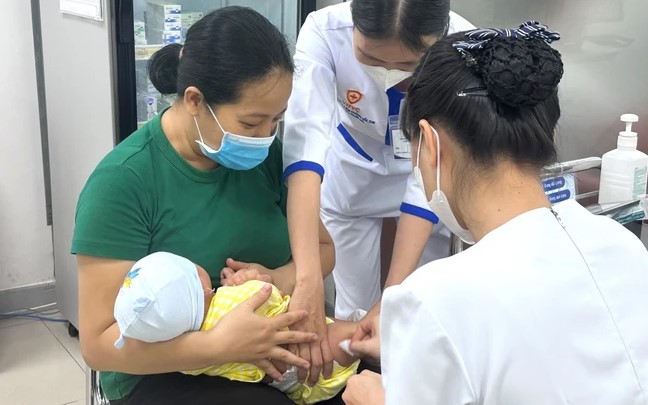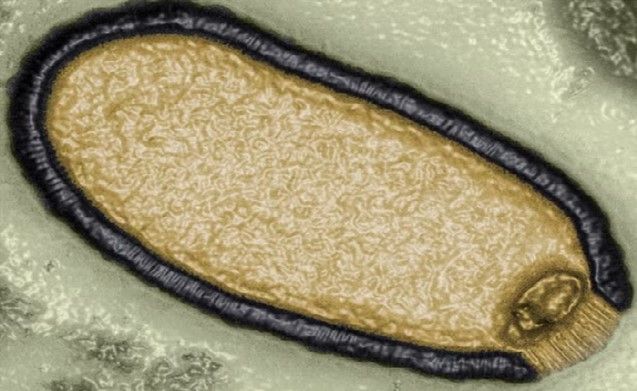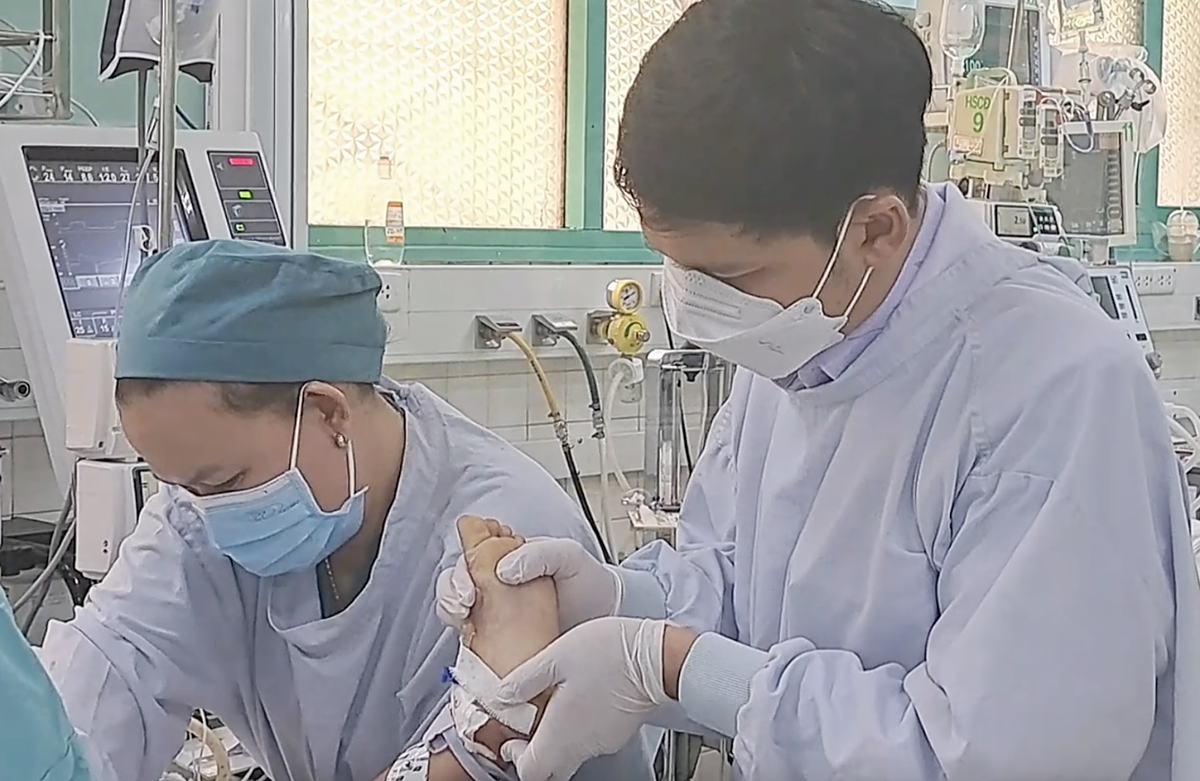Protect young children from the risk of infectious disease outbreaks
- Young children who are not yet at vaccination age or are late for vaccination are susceptible to dangerous infectious diseases such as whooping cough, measles, diphtheria...

Recently, the Hanoi Department of Health recorded a case of whooping cough in a 6-week-old child. Initially, the baby was diagnosed with bronchitis, but taking medicine did not improve it. He coughed more and more at night, and the cough lasted up to 10 minutes. Hospitalized for the second time, the patient's PCR test was positive for pertussis bacteria. Notably, according to the report of the infectious disease surveillance system, from the beginning of the year until now, the whole country has recorded 31 cases of whooping cough while in 2022 only recorded 2 cases.
According to the Department of Preventive Medicine, Ministry of Health, more than 90% of whooping cough cases in recent years are children under 1 year old who have not been vaccinated or have not received enough basic shots. Surveillance results in 2015 showed that 88.4% of cases were not vaccinated. 6.6% of cases received only 1 injection, not enough regimen.
Doctor Bui Thanh Phong, Medical Manager, VNVC Vaccination System, said whooping cough is characterized by severe coughing spells and causes many dangerous complications. The disease has a high mortality rate in children under 1 year old. In the initial stage, children often cough profusely with 15-20 consecutive coughs and a hissing sound that sounds like a chicken. The more you cough, the more your child loses strength, his face turns purple, his eyes become red and he may stop breathing because of coughing too much.
Bronchitis, prolonged cough, and apnea are the most common complications. Besides, patients may experience intussusception, hernia, and rectal prolapse. In severe cases, alveoli can rupture, pneumothorax, and encephalitis leading to death.
Humans are the only reservoir for the bacteria. 80% of household contacts have the ability to transmit the disease to each other. Whooping cough is most contagious in the first 2 weeks after onset of illness. One person with whooping cough can infect 12-17 people, easily causing an outbreak. The disease is transmitted through the respiratory tract, close contact or touching objects containing respiratory secretions of an infected person.
The disease does not only occur in children, adults can also get whooping cough and become a source of infection for children. Medical literature has recorded cases of infected adults coughing until their ribs were broken. Adults with whooping cough may not show symptoms or cough but do not have the characteristic wheezing sound like young children, and the cough can last for many months. If not detected promptly, the disease can spread widely in the community.
Experts warn that in the context of many places running out of expanded vaccination (EPI) vaccines as currently, in addition to whooping cough, many other diseases may also flare up again such as measles, diphtheria... Besides, many epidemics Diseases such as flu, Covid, respiratory syncytial virus RSV, adeno virus... causing respiratory infections are also becoming complicated. Children under 1 year old with weak immune systems are susceptible to diseases that can cause life-threatening illnesses. Many early childhood vaccines need to be administered early, as soon as they reach vaccination age to optimally protect the child and avoid the risk of disease.
Currently, most dangerous diseases for young children such as influenza, diphtheria, measles, pneumococcus causing pneumonia, otitis media and meningitis, rotavirus causing acute diarrhea... have vaccines to prevent.
Each type of vaccine has a different age limit for vaccination, so parents should be careful not to miss the opportunity to prevent their children from getting sick. For example, children need to be vaccinated with 5-in-1 and 6-in-1 combination vaccines before 2 years old, and Rotavirus vaccine needs to be vaccinated before 8 months of age. If for some reason the vaccination must be postponed, the child will not be able to make up for the vaccination. when too old.
Vaccines with pertussis components are indicated for early vaccination in children as young as 6 weeks old, popular in EPI programs and service vaccination centers such as at VNVC. People can vaccinate children with replacement services when the EPI program runs out of vaccines. The 6-in-1 vaccine has a polio prevention component and acellular pertussis component, so it rarely causes fever or pain at the injection site for children and children do not need to take additional polio vaccine.
In addition, to protect children who are not yet at vaccination age, pregnant mothers, adults and family members also need to be vaccinated to create disease-preventing antibodies for themselves, their fetuses and newborns. There are currently many types of vaccines that prevent many diseases in one injection and have a long booster vaccination period, which is completely convenient for the injector. The combined diphtheria - pertussis - tetanus vaccine only needs a booster shot every 10 years. The flu vaccine only needs to be given once a year. Pneumococcal vaccine 13 only requires a single injection for people 2 years of age and older.
According to a study just published in May 2023 on the website ScienceDirect, pregnant mothers vaccinated against diphtheria - pertussis - tetanus, especially at 27-36 weeks of pregnancy, provide protection from cough. chicken over 90% in young children.
Dr. Phong also noted that in addition to vaccination for children and adults, people need to combine personal hygiene measures to reduce disease such as not having close contact with infected or suspected people; Wear a mask and keep distance when going to crowded places; Clean your hands regularly with soap or antiseptic water; Keep the home and surrounding environment clean and airy.
In order to update the latest scientific information on important vaccines for children, at 8:00 p.m. on December 8, 2023, VNVC Vaccination System coordinated with Vietnam Television to conduct an online consultation program "Types of vaccines". important in a child's early life that cannot be ignored.
The program has experts: Dr. Nguyen An Nghia, Deputy Head of the Department of Infectious Diseases - Neurology, Children's Hospital 1, City. Ho Chi Minh; Dr. Bui Thanh Phong, Medical Manager, VNVC Vaccination System.
Interested readers can ask questions to experts in the program here.
The program is broadcast on the VTVGo application of Vietnam Television and fanpages: VTV24 News Center, VTV8 - Hot News in the Central Region, VNVC - Vaccination Center for Children and Adults and many press channels. other.
Currently, nearly 150 VNVC vaccination centers are present in nearly 50 provinces and cities across the country, ready to prevent diseases for children and adults, including first-life vaccines for children. VNVC currently has a full range of vaccines with the same effects as the vaccines in the EPI program such as 5-in-1 vaccine to prevent 5 diseases: diphtheria - pertussis - tetanus - polio - Hib at the same time; 6-in-1 vaccine protects against the above 5 diseases and hepatitis B.
VNVC is also applying many price incentives and community support programs such as free blood pressure measurements for all people, free tuberculosis vaccines for newborns, and the "vaccinate now, pay later" program with no interest. .









 Facebook
Facebook
 Tweet
Tweet
 Zalo
Zalo







 News
News

















 Sign in with Facebook
Sign in with Facebook
 Sign in with Google
Sign in with Google